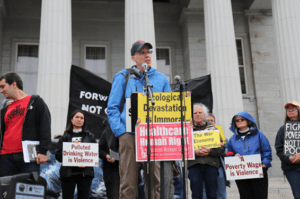By Emma Cotton/VTDigger
It’s time for Baby Boomers and members of the Silent Generation to organize against climate change, according to veteran environmental activist and writer Bill McKibben.

Bill McKibben speaks at Poor People’s Campaign protest at the Statehouse in 2018.
The Ripton resident is known for founding the grassroots environmental organization 350.org with a group of Middlebury College students in 2008 and writing one of the first books about climate change for a general audience, “The End of Nature,” published in 1989.
Now, he’s stepping away from his weekly New Yorker column to dedicate more time to a new organization, called Third Act, aimed at engaging activists over age 60.
McKibben announced a “very soft launch” of the organization on Twitter on Wednesday afternoon, Sept. 1. By midday Thursday, he said, thousands of people had already signed up.
McKibben, who is 60 years old himself, said he’s become convinced that his generation should more actively join the climate movement, following in the footsteps of a galvanized youth. He noted that Americans his age and older have a large share of the country’s financial assets and a tendency to vote in high numbers, giving them political power.
“There’s not enough pressure yet to produce the results that science requires,” said McKibben in a phone interview, his voice raised over the sounds of New York City streets. He had planned to return to Vermont on Thursday, but disastrous flooding from the remnants of Hurricane Ida shut down transportation in the city. The storm’s rising death toll includes at least 24 people in New York, New Jersey and Pennsylvania.
Scientists have come to a consensus that climate change is intensifying hurricanes — causing higher winds, warmer ocean surfaces and more precipitation in the Atlantic Ocean, and broadening the regions where storms can hit hard, he said. “The West is on fire, the East is underwater, and yet nothing, really, is happening,” McKibben said. “And that’s kind of the genesis of this idea.”
People in their “third act,” McKibben said — those age 60 and older — are likely to have skills, resources, time and “sometimes a lot of grandchildren,” who can serve as added incentive to act for the benefit of future generations. Generally, they also have wealth: In the U.S., Baby Boomers own more than half of the estimated $50 trillion in household assets in the country, according to reporting by The Wall Street Journal.
“If you’re the manager of the Chase Bank in Burlington or something, the people with the most money sitting in your bank are likely to be, you know, a little longer in the tooth,” McKibben said. “You might not just brush them off.”
He hopes to form local chapters of Third Act. The movement might be particularly relevant in Vermont, he said, where 20% of people are age 65 or older.
As the organization gets off the ground, he said it will need people who are well-versed in “the actual mundane, important tasks of the world” like administration, coordination and development.
“Being an ex-teacher, or a former nurse, or whatever it is, should be an enormous source of pride and expertise that we really need in societies,” he said. “We can’t just toss it away the minute someone retires.”
He also hopes the movement will address issues like voter suppression and racial justice.
The landing page for the movement hosts a number of recognizable characters who have joined McKibben’s fight: Potawatomi scientist and writer Robin Wall Kimmerer; actor and activist Jane Fonda; minister and activist Rev. Lennox Yearwood Jr.; Sen. Bernie Sanders, I-Vt.; and Swedish youth climate activist Greta Thunberg.
Kimmerer, speaking in a video on the site, said that in the Potawatomi tradition, “Elderhood is not a time for stepping back, but for stepping up, for stepping into your own power.”
“Becoming an elder is both a precious gift and a serious responsibility — a responsibility for sharing knowledge, and for safeguarding the future of life,” she said.
For more information visit thirdact.org.




